福建省厦门六中2014届高三考前模拟(英语)2
- 格式:doc
- 大小:54.50 KB
- 文档页数:7
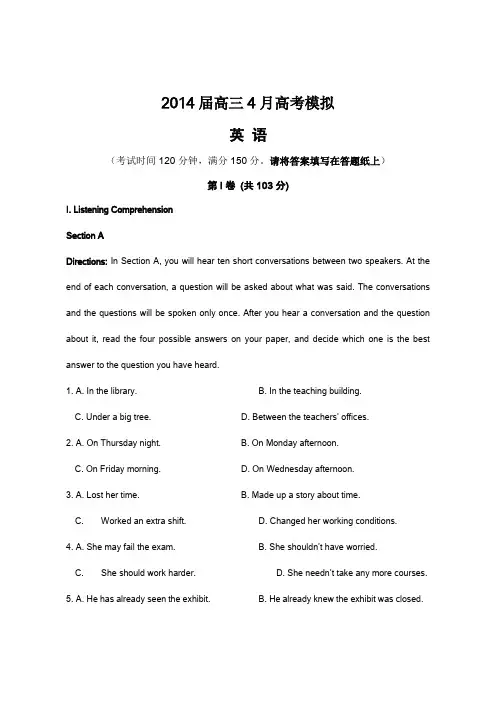
2014届高三4月高考模拟英语(考试时间120分钟,满分150分。
请将答案填写在答题纸上)第I卷(共103分)I. Listening ComprehensionSection ADirections: In Section A, you will hear ten short conversations between two speakers. At the end of each conversation, a question will be asked about what was said. The conversations and the questions will be spoken only once. After you hear a conversation and the question about it, read the four possible answers on your paper, and decide which one is the best answer to the question you have heard.1. A. In the library. B. In the teaching building.C. Under a big tree.D. Between the teachers’ offices.2. A. On Thursday night. B. On Monday afternoon.C. On Friday morning.D. On Wednesday afternoon.3. A. Lost her time. B. Made up a story about time.C. Worked an extra shift.D. Changed her working conditions.4. A. She may fail the exam. B. She shouldn’t have worried.C. She should work harder.D. She needn’t take any more courses.5. A. He has already seen the exhibit. B.He already knew the exhibit was closed.C.He is pleased the exhibit is closed.D.He is disappointed the exhibit is closed.6. A. Stand where he was. B. Stand beside the woman.C. Stand at the end of the queue.D. Stand in front of the woman.7. A. Colleagues. B. Doctor and patient.C. Neighbours.D. Shop assistant and customer.8. A. He enjoyed reading the novel.B.He hasn’t started reading the novel yet.C.He doubts the woman will like the novel.D.He’ll lend the woman the novel after he has read it.9. A. A college campus. B. An art museum.C. An architectural exhibition.D. A beautiful park.10. A. The man regrets being absent-minded. B. The woman saved the man some trouble.C. The man placed the reading list on a desk.D. The woman emptied the waste paper basket.Section BDirections:In Section B, you will hear two short passages, and you will be asked three questions on each of the passages. The passages will be read twice, but the questions will be spoken only once. When you hear a question, read the four possible answers on your paper and decide which one would be the best answer to the question you have heard.Questions 11 through 13 are based on the following speech.11. A. Future researchers. B. College students.C. Company employees.D. Successful artists.12. A. To teach the listeners how to work hard.B. To enable the listeners to get better jobs.C. To prepare the listeners for their future life.D. To encourage the listeners to seize opportunities.13. A. Kindness. B. Diligence. C. Willingness. D. Interest.Questions 14 through 16 are based on the following passage.14. A. The advantages of studying abroad.B. The high expenses of overseas education.C. The standards of choosing schools abroad.D. The ways of saving money for international students.15. A. Hong Kong. B. Australia. C. The United States. D. The United Kingdom.16. A. US$24,248. B. US$35,000. C. US$22,000. D.US$30,000.Section CDirections:In Section C, you will hear two longer conversations. The conversations will be read twice. After you hear each conversation, you are required to fill in the numbered blankswith the information you have heard. Write your answers on your answer sheet. Blanks 17 through 20 are based on the following conversation.Complete the form. Write ONE WORD for each answer.Blanks 21 through 24 are based on the following conversation.Complete the form. Write NO MORE THAN THREE WORDS for each answer.II. Grammar and VocabularySection ADirections: After reading the passages below, fill in the blanks to make the passages coherent and grammatically correct. For the blanks with a given word, fill in each blank with the proper form of the given word; for the other blanks,use one word that best fits each blank.(A)Senator Jeff Flake, an adventurous politician, went on a four-day Robinson Crusoe style holiday with his two sons, (25)_____ of whom are teenagers, to a remote, uninhabited island in the North Pacific Ocean. They traveled 5,200 miles from Phoenix, Arizona to the island of Biggarenn. They didn’t carry any food or wat er.The island is part of the Marshall Islands. It offered no basic facilities, (26)_____ the Flakes had to catch and cook their own food and purify their water. Their diet (27)_____(make) up of coconuts (椰子), fish and other seafood. They captured the fish and other sea creatures themselves and cooked the food over an open fire (28)_____(start) with a magnifying glass (放大镜).The Flakes brought along a lobster (龙虾) trap in hopes of having some delicious treats, but it was lost within the first few hours after (29)_____(attack) by a shark. They also carried two pumps to remove salt from ocean water. It took them hours each night (30)_____ (pump)for just a small amount of fresh water.One of the most memorable moments of the trip, the father said, was (31)_____ he and his 15-year-old son were chased by sharks after catching a fish in the ocean.Still, it was quite (32)_____ enjoyable holiday for the politician. “For a dad it was a wonderful thing. No video games around, no television, no texting,” Flake recalle d.(B)Count to three and rip (撕) it off as fast as you can—this is how most people remove a band-aid (创可贴). (33)_____ _____ _____ fast you do it, it’s still going to be painful. That’s for sure. Or is it?A group of American scientists from Boston have just developed a band-aid that can be taken off without causing pain, reports the journal Proceedings of the National Academy of Sciences.Traditional band-aids are supposed to break apart (34)_____ the skin meets the glue, which is what makes taking them off so painful. But the new band-aid has an extra layer that sits (35)_____ the glue and the backing. When you tear off the band-aid, you remove the backing and middle layers, (36)_____(leave) the glue behind. The glue (37)_____ then be simply rubbed off wi th one’s fingers or left to fall off naturally. Importantly, this process is pain-free.This is not the first time scientists (38)_____(try) to solve this problem. But methods theytried in the past led to band-aids that were (39)_____(sticky) and therefor e didn’t stay on for long.The Boston study was first aimed at helping babies (40)_____ skin is too delicate for standard band-aids. But adults with sensitive skin might also enjoy the benefits.Section BDirections: Complete the following passage by using the words in the box. Each word can only be used once. Note that there is one word more than you need.A new report by the World Health Organization (WHO) reveals that around one in a hundred deaths worldwide is due to passive smoking, which kills an estimated 600,000 people a year.In the first study to assess the global __41__ of second-hand smoke, WHO experts find that children are more __42__ exposed to second-hand smoke than any other age-group, and around 165,000 of them a year die because of it.Children’s exposure to second-hand smoke is most likely to happen at home, and thedouble blow of infectious diseases and tobacco seems to be a deadly __43__ for children in these regions. Commenting on the findings, Heather Wipfli and Jonathan Samet from the University of Southern California, said policymakers try to __44__ families to stop smoking in the home.While deaths due to passive smoking in children were skewed (曲解) toward poor and middle-income countries, deaths in adults were __45__ across countries at all income levels.In Europe’s high-income countries, only 71 child deaths occurred, while 35,388 deaths were in adults. Yet in the countries like Africa, an estimated 43,375 deaths due to passive smoking were in children __46__ with 9,514 in adults.Only 7.4 percent of the world population currently lives in places with __47__ smoke-free laws, and those laws are not always __48__ enforced (施行). In places where smoke-free rules are __49__, research shows that exposure to second-hand smoke in high-risk places like bars and restaurants can be cut by 90 percent, and in general by 60 percent, the researchers said.Studies also show such laws help to reduce the number of cigarettes smoked by smokers and lead to higher __50__ rates in those trying to quit.III. Reading ComprehensionSection ADirections: For each blank in the following passage there are four words or phrases marked A, B, C and D. Fill in each blank with the word or phrase that best fits the context.Due to rising pollution and a strengthening yuan, Beijing saw its tourist numbers drop to 4.20 million visits from January to November in 2013 from 5.01 million visits in 2012.The number of overseas travelers to Beijing grew after the city hosted the 2008 Olympics until 2012, when it saw a 3.8% __51__, followed by the further drop last year. The unexpected drop in 2013 came __52__ new policies introduced in a(n) __53__ to support China’s tourism industry. But only 14,000 tourists __54__ the visa-free stopover, according to the Beijing General Station of Exit and Entry Frontier Inspection, well short of the 20,000 target officials had __55__ predicted.Jiang Yiyi, deputy director of the Institute of International Tourism at the China Tourism Academy, __56__ part of the drop-off in foreign tourists to the strengthening yuan.In 2013, the yuan increased almost 3% against the U.S. dollar, making “Beijing a more expensive __57__ than in the past”, Jiang Yiyi noted.“At the same time,” she said, “other countries have seen their tourist numbers grow as the currencies (货币) __58__. While RMB is on the rise, currencies from some of China’s __59__ for tourism, such as Japan, are depreciating (贬值), meaning travel to some other Asian countries has been getting cheaper while travel to China is becoming more expensive,” Jiang Yiyi said. In 2013, the Japanese yen fell 21% against the U.S. dollar, __60__ 10 million overseas tourists.The Beijing Tourism Development Commission noted that the country’s battle with pollution is another __61__ cities face in attracting overseas tourists.Heavy air pollution from Beijing to Shanghai, where pollution levels went off the charts in December, __62__ don’t do much to help attract tourists.China’s tourism officials are expecting to __63__ the trend of declining overseas visitors in 2014 — possible, experts say, if it __64__ its outdated tour packages and lowers ticket prices.Jiang Yiyi at the China Tourism Academy suggests China adopt a long-term national plan to __65__ the country’s image and investment in overseas tourism to attract more visitors.51. A. growth B. decline C. change D. influence52. A. in addition to B. by means of C. as a result of D. in spite of53. A. attempt B. agreement C. hurry D. mood54. A. got familiar with B. came up with C. took advantage of D. put emphasis on55. A. fortunately B. frequently C. previously D. occasionally56. A. devoted B. owed C. attached D. exposed57. A. destination B. tourism C. authority D. association58. A. reform B. collapse C. stabilize D. weaken59. A. competitors B. supporters C. investors D. reminders60. A. inspiring B. attracting C. disappointing D. embarrassing61. A. opportunity B. situation C. obstacle D. alternative62. A. relevantly B. approximately C. dramatically D. certainly63. A. set B. reverse C. confirm D. follow64. A. revises B. sells C. excludes D. demonstrates65. A. create B. keep C. damage D. improveSection BDirections: Read the following three passages. Each passage is followed by several questions or unfinished statements. For each of them there are four choices marked A, B, C and D. Choose the one that fits best according to the information given in the passage you have just read.(A)On “Super Bowl Sunday”, millions of Americans are glued to their TVs. They are eating pizza, chicken wings and chips and cheering every move. They’re watching the Super Bowl.Why are Americans so crazy about American football? Well, it is more exciting than other sports. One team can lose possession of the ball in a minute, which may allow their opponents to make a touchdown (触地得分). Then that team may win the game unexpectedly.The Super Bowl also entertains its audience with a great halftime show. The football field is turned into a stage. Then an impressive performance of dancing and singing with special effects occurs.Since the Super Bowl is the most-watched TV program in America, commercial airtime is also very expensive. Big money is also spent on commercials. They draw the viewers’attention and advertise their image or products during the commercial break.After football season, the “March Madness”begins. The NCAA (National Collegiate Athletic Association) competitions begin with 68 men’s college basketball teams. They play until the field is reduced to the “Final Four”. The winning team becomes the national champion. The NBA (National Basketball Association) All-Star game is also held in February. The best players from all the teams play in this game.Baseball is no doubt American’s national sport. From grandpas to young kids, whole families go to ball games together. They wear their favorite team’s caps or even carry their mascot (吉祥物). Our family went to watch Wang Chien-Ming play in D.C. once. We ate hot dogs, waved flags and sang during the 7th inning (棒球的一局) stretch.If you are not a sports fan yet, come and pick a sport or a team. Go to a ball game with your family, and cheer your team on. Sports are definitely a part of American culture one should not miss.66. According to the passage, the Super Bowl is _____.A. a well-received American football gameB. an expensive American sportC. an impressive TV performanceD. a most-watched TV series67. Which of the following may be one of the reasons for the popularity of the Super Bowl?A. Its results are too exciting to meet viewers’ expectations.B. People can eat pizza, chicken wings and chips when watching it.C. Its commercials are expensive enough to draw viewer s’ attention.D. The performances during its halftime show are appealing to viewers.68. Which of the following is TRUE according to the passage?A. Americans spend a large amount of money on ball games.B. American people of all ages like going to watch baseball games.C. All the American stars take part in the national basketball game.D. There are important national ball games in America almost every month.69. The passage is mainly written to _____.A. inform readers of the three popular sports in AmericaB. teach readers how to understand the sports culture in AmericaC. encourage readers to fit in with American culture through sportsD. show readers the importance of sports in young people’s life in America(B)70. Which of the following steps can be omitted if you want the robot to charge itself automatically?A. Press the HOME button on the remote control.B. Clear up the place around the charging home base.C. Turn on the power switch at the bottom of the robot.D. Put the charging home base against the wall and plug it in.71. If it’s 9:45PM now and you want the robot to start cleaning at 8:00AM tomorrow, you shouldset _____ on the robot.A. 13:45B. 10:15C. 8:00D. 1:4572. If you want the robot to start cleaning right now, you can _____.A. keep pressing the CLEAN button on the main body for 3 secondsB. press either of PLAN, SPOT, CLEAN and HOME buttons on the main bodyC. turn on the power switch and press the CLEAN button on the remote control onceD. press the CLEAN button on the main body once when the robot is in the sleeping mode73. The virtual wall is designed to _____.A. limit the robot to a certain areaB. prevent the robot from bumping into wallsC. stop the robot from reaching 4 metersD. create a bunch of light outside thedoorway(C)We have entered a new age of embedded (嵌入式的), intuitive (直觉的) computing in which our homes, cars, stores, farms, and factories have the ability to think, sense, understand, and respond to our needs. It’s not science fiction, but the dawn of a new age.Most people might not realize it yet, but we are already feeling the impact of what’s known as the third wave of computing. In small but significant ways it is helping us live healthier and more secure lives. If you drive a 2014 Mercedes Benz, for example, an “intelligent” system tries to keep you from hitting a pedestrian. A farmer in Nigeria relies on weather sensors that communicate with his mobile device. Forgot your medicine? A new pill bottle from AdhereTech reminds you through text or automatic phone messages that it’s time to take a pill.Technology is being integrated (融入) into our natural behaviors, with real-time data connecting our physical and digital worlds. With this dramatic shift in our relationship to technology, companies can adapt their products and services.To understand how revolutionary the third wave is, we ought to consider how far we have come. The first wave began when companies started to manage their operations throughmainframe computer systems over 50 years ago. Then computing got “personal” in the 1980s and the 1990s with the introduction of the PC (personal computer). For the most part, computing remained immobile and lacked contextual awareness.In computing’s second wave, mobile computing and the smartphone took center stage. Billions of people, some of whom might not have had access to clean water, electricity, or even housing, were connected. Developers created applications and provided consumers with access to just about everything through their phone at the cost of a monthly data plan.As the third wave keeps developing, designers must meet the demands of consumers who want to experiment with new technology.Historically, designers have focused their attention on a product’s form and function. While that still matters, of course, the definition of a meaningful user experience has expanded significantly and will continue to do so. Instead of creating a single product, designers will need to imagine a series of connected products and services that have awareness of each other and their surroundings.74. Why are three examples given in Paragraph 2?A. To tell us that human beings are smarter and smarter.B. To illustrate the importance and necessity of technology.C. To prove that we are living healthier and more secure lives.D. To show the impact of the third wave of computing on our life.75. In the first wave of computing _____.A. companies’ operations were reliable on computer systemsB. computing had awareness of people’s needs in the contextC. people could have access to computing almost everywhereD. it was possible for people to experience computing at home76. Which of the following is a situation in the third wave of computing?A. There’s no need to create a single product.B. The definition of the user experience is more significant.C. Products and services are not independent of each other.D. The products’ form and functions are no longer important.77. What can we conclude from the passage about the new age we are facing?A. There’s a shift of attention from people’s physical worlds to their digital worlds.B. There’s closer relationship between technology and people’s natural behaviours.C. People live more happily with the convenience brought by advanced technology.D. People become lazier with the products that can think and respond to their needs.Section CDirections: Read the passage carefully. Then answer the questions or complete the statements in the fewest possible words.How many hours do you spend sitting in a chair every day? Eight hours in the office plus three hours in front of the TV after work is the usual situation for many people.You probably don’t need an expert to tell you that sitting too much is not good for your health —from an increased risk of heart disease and obesity (肥胖) in the long term, to reduced cholesterol (胆固醇) maintenance in the short term, not to mention the pressure on your neck and spine (脊柱).To make matters worse, a growing body of research suggests that the negative effects of sitting too much cannot be countered with a good diet and regular exercise, according to an article in The New York Times. The article reported that a study of nearly 9, 000 Australians found that for each additional hour of television a person watched per day, the risk of dying rose by 11 percent. In other words, sitting is killing us.Stand up for health. Health experts suggest we break up those many hours spent sitting with more hours spent standing.The BBC and the University of Chester in the UK conducted a simple experiment with a small group of 10 volunteers who usually spent most of the day sitting. They were asked to stand for at least three hours a day. The researchers took measurements on days when the volunteers stood, and when they sat around. When they looked at the data, there were some striking differences. Blood sugar became level after a meal much quicker on the days when the volunteers in the study stood compared with the days they spent in a chair. Standing also burned more calories (热量单位:卡路里)—about 50 calories an hour. Over the course of a year that would add up to about 30, 000 extra calories, or around 3.63 kilograms of fat.John Buckley, a member of the research team, said that although doing exercise offers many proven benefits, our bodies also need the constant, almost imperceptible (感觉不到的) increase in muscle activity that standing provides. Simple movement helps us to keep our all-important blood sugar under control.The researchers believe that even small adjustments, like standing while talking on the phone, going over to talk to a colleague rather than sending an e-mail, or simply taking the stairs instead of the elevator, will help.(Note: Answer the questions or complete the statements in NO MORE THAN TEN WORDS.)78. According to the context, the underlined expression “be countered with” in Paragraph 3can best be replaced by “________”.79. The two findings of the simple experiment conducted by the BBC and the University ofChester in the UK are that standing _________.80. Why is standing better than doing exercise according to John Buckley?81. What does the passage mainly want to tell us?第II卷(共47分)I. TranslationDirections:Translate the following sentences into English, using the words given in the brackets.1. 你认为有必要采取措施保护上海方言吗?(it)2. 提前做出周密计划可以帮你更有效地完成这项艰巨任务。
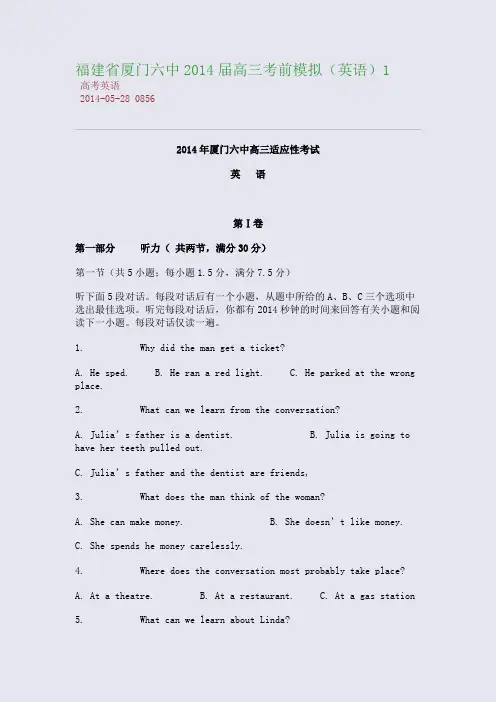
福建省厦门六中2014届高三考前模拟(英语)1高考英语2014-05-28 08562014年厦门六中高三适应性考试英语第Ⅰ卷第一部分听力(共两节,满分30分)第一节(共5小题;每小题1.5分,满分7.5分)听下面5段对话。
每段对话后有一个小题,从题中所给的A、B、C三个选项中选出最佳选项。
听完每段对话后,你都有2014秒钟的时间来回答有关小题和阅读下一小题。
每段对话仅读一遍。
1. Why did the man get a ticket?A. He sped.B. He ran a red light.C. He parked at the wrong place.2. What can we learn from the conversation?A. Julia’s father is a dentist.B. Julia is going to have her teeth pulled out.C. Julia’s father and the dentist are friends,3. What does the man think of the woman?A. She can make money.B. She doesn’t like money.C. She spends he money carelessly.4. Where does the conversation most probably take place?A. At a theatre.B. At a restaurant.C. At a gas station5. What can we learn about Linda?A. She only has a good head for mathematics.B. She is not good at other subjects.C. She is clever and works hard.第二节(共15小题;每小题1.5分,满分22.5分)听下面5段对话或独白。
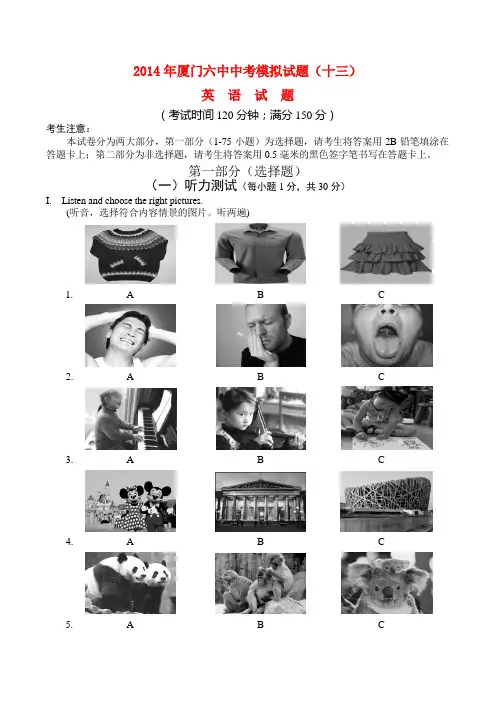
2014年厦门六中中考模拟试题(十三)英语试题(考试时间120分钟;满分150分)考生注意:本试卷分为两大部分,第一部分(1-75小题)为选择题,请考生将答案用2B铅笔填涂在答题卡上;第二部分为非选择题,请考生将答案用0.5毫米的黑色签字笔书写在答题卡上。
第一部分(选择题)(一)听力测试(每小题1分,共30分)I. Listen and choose the right pictures.(听音,选择符合内容情景的图片。
听两遍)1. A B C2. A B C3. A B C4. A B C5. A B CII. Listen to some short dialogues and choose the right answers to the questions you hear.(听简短对话,然后挑选最佳答案回答所听到的问题。
听两遍)6. A. Paper. B. Money. C. Cards.7. A. By taxi. B. On foot. C. By bus.8. A. Did very well. B. Could do better. C. Tried his best.9. A. Math. B. Science. C. History.10. A. Not often. B. Once a week. C. Every day.11. A. Short curly hair. B. Long curly hair. C. Short straight hair.12. A. March 7. B. March 8. C. March 9.13. A. At home. B. In a barber shop. C. At school.14. A. Weekend activities. B. Computer games. C. Ball game tickets.15. A. Seeing a film. B. Eating snacks. C. Talking loudly.III. Listen to a long dialogue and a passage, then choose the right answers to questions 16-20.(听一篇较长对话和一篇短文,然后选择正确答案作答16 – 20小题。
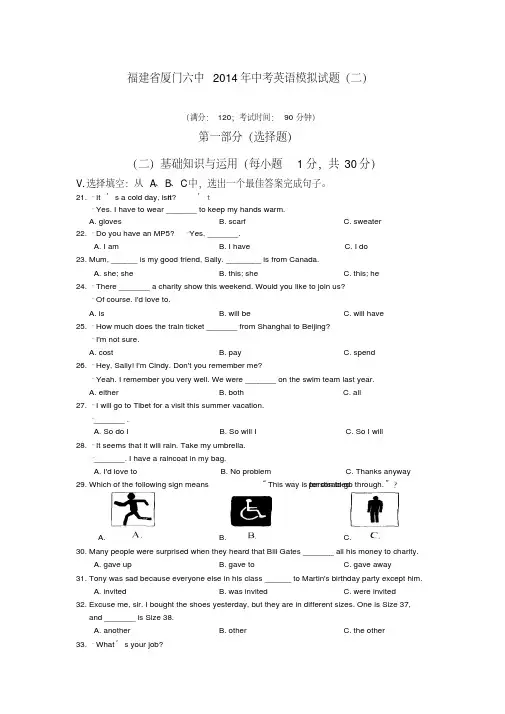
福建省厦门六中2014年中考英语模拟试题(二)(满分:120;考试时间:90分钟)第一部分(选择题)(二)基础知识与运用(每小题1分,共30分)V.选择填空:从A、B、C中,选出一个最佳答案完成句子。
21. –It’s a cold day, isn’tit?– Yes. I have to wear _______ to keep my hands warm.A. glovesB. scarfC. sweater22. – Do you have an MP5? –Yes, _______.A. I amB. I haveC. I do23. Mum, ______ is my good friend, Sally. ________ is from Canada.A. she; sheB. this; sheC. this; he24. – There _______ a charity show this weekend. Would you like to join us?– Of course. I'd love to.A. isB. will beC. will have25. – How much does the train ticket _______ from Shanghai to Beijing?– I'm not sure.A. costB. payC. spend26. – Hey, Sally! I'm Cindy. Don't you remember me?– Yeah. I remember you very well. We were _______ on the swim team last year.A. eitherB. bothC. all27. – I will go to Tibet for a visit this summer vacation.–_______ .A. So do IB. So will IC. So I will28. – It seems that it will rain. Take my umbrella.–_______. I have a raincoat in my bag.A. I'd love toB. No problemC. Thanks anywayperson to go through.”?29. Which of the following sign means “This way is for disabledA. B. C.30. Many people were surprised when they heard that Bill Gates _______ all his money to charity.A. gave upB. gave toC. gave away31. Tony was sad because everyone else in his class ______ to Martin's birthday party except him.A. invitedB. was invitedC. were invited32. Excuse me, sir. I bought the shoes yesterday, but they are in different sizes. One is Size 37,and _______ is Size 38.A. anotherB. otherC. the other33. –What’s your job?– I am a manager. But the first job _______ I found was a cleaner.A. thatB. whatC. where34. – Come on, Rose. Who broke my glass?– _______ Susan _______ I, Mum. It was a cat.A. Both, andB. Neither, norC. Either, or35. – What delicious bread!– That's right. It will taste _______ with butter.A. wellB. worseC. better36. – These bananas look different and they are sweet.– Right. They _______ here from Taiwan yesterday.A. broughtB. were broughtC. were bought37. – Could you help me put up the signs on the wall?–_______.A. No problemB. I hope soC. That’s all right38. – Is the lake there beautiful?– The photo will show you _______.A. what it looks likeB. what does it look likeC. how it looks liketo understand.39. –There are _______ new words in the text. It’s very easy for you– However, still some difficult sentences.A. fewB. a fewC. little40. – Do you mind if I sit here?.– No, but _______. It’s for the old, young manA. take itB. of course notC. better notVI.完形填空:从A、B、C中,选出一个最佳答案,使短文意思完整。
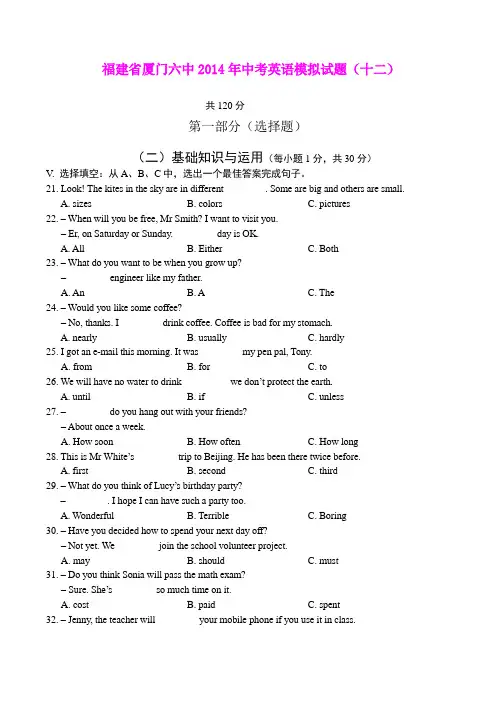
福建省厦门六中2014年中考英语模拟试题(十二)共120分第一部分(选择题)(二)基础知识与运用(每小题1分,共30分)V.选择填空:从A、B、C中,选出一个最佳答案完成句子。
21. Look! The kites in the sky are in different ________. Some are big and others are small.A. sizesB. colorsC. pictures22. – When will you be free, Mr Smith? I want to visit you.– Er, on Saturday or Sunday. ________ day is OK.A. AllB. EitherC. Both23. – What do you want to be when you grow up?– ________ engineer like my father.A. AnB. AC. The24. – Would you like some coffee?– No, thanks. I ________ drink coffee. Coffee is bad for my stomach.A. nearlyB. usuallyC. hardly25. I got an e-mail this morning. It was ________ my pen pal, Tony.A. fromB. forC. to26. We will have no water to drink _________ we don’t protect the earth.A. untilB. ifC. unless27. – ________ do you hang out with your friends?– About once a week.A. How soonB. How oftenC. How long28. This is Mr White’s ________ trip to Beijing. He has been there twice before.A. firstB. secondC. third29. – What do you think of Lucy’s birthday party?– ________. I hope I can have such a party too.A. WonderfulB. TerribleC. Boring30. – Have you decided how to spend your next day off?– Not yet. We ________ join the school volunteer project.A. mayB. shouldC. must31. – Do you think Sonia will pass the math exam?– Sure. Sh e’s ________ so much time on it.A. costB. paidC. spent32. – Jenny, the teacher will ________ your mobile phone if you use it in class.– Sorry, I won’t do that again.A. take outB. take awayC. take off33. It’s not easy for Helen to ________ such a little baby. He is always crying.A. look forB. care forC. ask for34 – I won’t go to the concert tonight because I ________ my ticket.– What a pity!A. have lostB. will loseC. lose35. – Susan , why are you still here ? They are all ready to start.– I’m sorry, but I ________ when to start.A. didn’t tellB. haven’t toldC. wasn’t told36. Barack Obama is the US president ________ always makes really exciting speeches.A. whoB. whoseC. which37. – Excuse me, could you tell me ________ for Hong Kong?– The day after tomorrow.A. when did you leaveB. when you are leavingC. where you are going38. – Y ou look tired. What’s wrong with you?– ________.A. I have a headacheB. I’m a science teacherC. I have a great time39. – I prefer to eat cakes that have cream on top.– ________! They are really delicious.A. I’m afraid notB. You’re kiddingC. Me, too40. – Remember to call me after arriving in Beijing .– ________.A. It doesn’t matterB. OK, I willC. Yes, I doVI.完形填空:从A、B、C中,选择一个最佳答案,使短文意思完整。
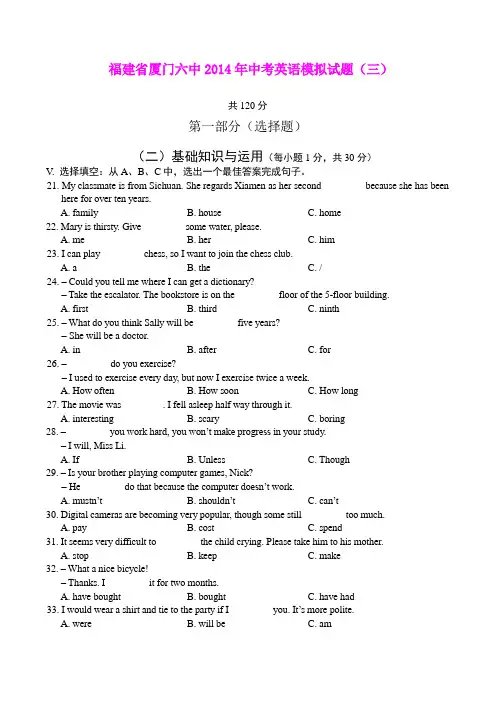
福建省厦门六中2014年中考英语模拟试题(三)共120分第一部分(选择题)(二)基础知识与运用(每小题1分,共30分)V.选择填空:从A、B、C中,选出一个最佳答案完成句子。
21. My classmate is from Sichuan. She regards Xiamen as her second ________ because she has beenhere for over ten years.A. familyB. houseC. home22. Mary is thirsty. Give ________ some water, please.A. meB. herC. him23. I can play ________ chess, so I want to join the chess club.A. aB. theC. /24. – Could you tell me where I can get a dictionary?– Take the escalator. The bookstore is on the ________ floor of the 5-floor building.A. firstB. thirdC. ninth25. – What do you think Sally will be ________ five years?– She will be a doctor.A. inB. afterC. for26. – ________ do you exercise?– I used to exercise every day, but now I exercise twice a week.A. How oftenB. How soonC. How long27. The movie was ________. I fell asleep half way through it.A. interestingB. scaryC. boring28. – ________ you work hard, you won’t make progress in your study.– I will, Miss Li.A. IfB. UnlessC. Though29. – Is your brother playing computer games, Nick?– He ________ do that because the computer doesn’t work.A. mustn’tB. shouldn’tC. can’t30. Digital cameras are becoming very popular, though some still ________ too much.A. payB. costC. spend31. It seems very difficult to ________ the child crying. Please take him to his mother.A. stopB. keepC. make32. – What a nice bicycle!– Thanks. I ________ it for two months.A. have boughtB. boughtC. have had33. I would wear a shirt and tie to the party if I ________ you. It’s more polite.A. wereB. will beC. am34. He ________ not to throw away the food, but he still did it.A. askedB. asksC. was asked35. – Could you please ________ my little sister while I am away?– Of course, I can do that.A. look forB. look atC. look after36. Please try ________ too much junk food! It’s bad for your health.A. not to eatB. to eatC. eating37. – Could you tell me ________?–I’m of medium build with long hair.A. what you look likeB. what do you look likeC. what you like38. Let’s go to the restaurant ________ the food is cheap and delicious.A. thatB. whereC. which39. – I think teenagers should be allowed to meet internet friends alone.– ________. It’s not safe enough.A. I disagreeB. I think soC. I agree40. –I don’t have a part ner to practice English with.– ________. Y ou could join an English club. It can help you a lot.A. Hurry upB. That’s OKC. Don’t worryVI.完形填空:从A、B、C中,选择一个最佳答案,使短文意思完整。
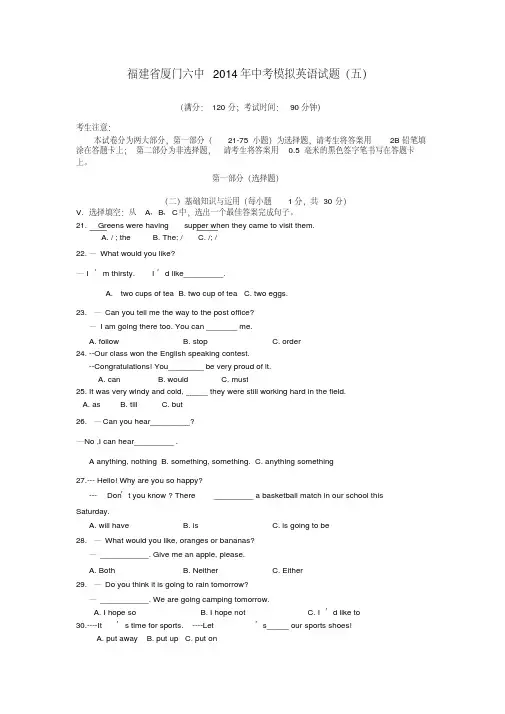
福建省厦门六中2014年中考模拟英语试题(五)(满分:120分;考试时间:90分钟)考生注意:本试卷分为两大部分,第一部分(21-75小题)为选择题,请考生将答案用2B铅笔填涂在答题卡上;第二部分为非选择题,请考生将答案用0.5毫米的黑色签字笔书写在答题卡上。
第一部分(选择题)(二)基础知识与运用(每小题1分,共30分)V. 选择填空:从A、B、C中,选出一个最佳答案完成句子。
21. Greens were having supper when they came to visit them.A. / ; theB. The; /C. /; /22.— What would you like?— I’m thirsty. I’d like_________.A.two cups of teaB. two cup of teaC. two eggs.23. — Can you tell me the way to the post office?— I am going there too. You can _______ me.A. followB. stopC. order24. --Our class won the English speaking contest.--Congratulations! You________ be very proud of it.A. canB. wouldC. must25. It was very windy and cold, _____ they were still working hard in the field.A. asB. tillC. but26. —Can you hear_________?—No ,I can hear_________ .A anything, nothing B. something, something. C. anything something27.--- Hello! Why are you so happy?--- Don’t you know ? There _________ a basketball match in our school this Saturday.A. will haveB. isC. is going to be28. — What would you like, oranges or bananas?— ___________. Give me an apple, please.A. BothB. NeitherC. Either29. — Do you think it is going to rain tomorrow?— ___________. We are going camping tomorrow.A. I hope soB. I hope notC. I’d like to30.----It’s time for sports. ----Let’s_____ our sports shoes!A. put awayB. put upC. put on31.----Is the girl ______ is interviewing the headmaster your friend?----Yes, she is my best friend.A. whomB. whichC.. who32. ----I’m sorry I _____my exercise book at home.---- Don’t forget _______ it to school tomorrow, please.A. forget ; to takeB. left ; to takeC. left ; to bring33.----There are few people in the street at midnight, ?----Yes,so you’d better go home before 10 o’clockA. are thereB. aren’t thereC. are they34.----Do you know where Miss Green is?----She the library to borrow some books.A. has gone toB. had been inC. has been to35. The plane hasn't arrived yet. Could you tell me_________?A. why the plane is lateB. how is the plane lateC. when will the planearrive36. My father ________in the morning , but now he likes running in the evening.A. is used to runningB. used to runC. gets used to running37.— Hi, Tom. Is your sister as active as you?— No, she’s a quiet girl. She is ________.A. less outgoing than IB. not so calm as IC. more active than I38. ---Did you hear that water in Tai Lake smelled terrible?--- Yes.It ___________ because of people and factories.A. pollutedB. was pollutedC.has polluted39. — ____________?— Since I was five years old.A. How often do you skate?B. When did you begin to play baseball?C. How long have you been studying French40.----How was the movie you saw yesterday?----I have no idea. By the time I got to the movie theatre, the movie ______.A. has already finishedB. have finished yetC. had already finishedVI. 完形填空:从 A.B.C中选出一个最佳答案,使短文意思完整。
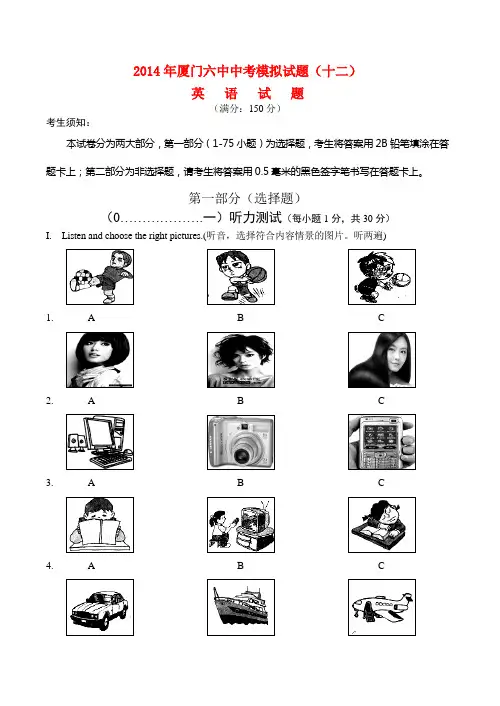
2014年厦门六中中考模拟试题(十二)英语试题(满分:150分)考生须知:本试卷分为两大部分,第一部分(1-75小题)为选择题,考生将答案用2B铅笔填涂在答题卡上;第二部分为非选择题,请考生将答案用0.5毫米的黑色签字笔书写在答题卡上。
第一部分(选择题)(0……………….一)听力测试(每小题1分,共30分)I. Listen and choose the right pictures.(听音,选择符合内容情景的图片。
听两遍)1. A B C2. A B C3. A B C4. A B C5. A B CII. Listen to some short dialogues and choose the right answers to the questions you hear.(听简短对话,然后挑选最佳答案回答所听到的问题。
听两遍)6. A. French. B. English. C. Spanish.7. A. Posting a letter. B. Asking the way. C. Looking for a job.8. A. $25. B. $35. C. $50.9. A. Noodles. B. Eggs. C. Dumplings.10. A. At a bookstore. B. At a shoe store. C. At a drugstore.11. A. Hainan. B. Beijing . C. Shanghai.12. A. March 3rd. B. March 13th. C. March 23rd.13. A. Tina. B. Sara. C. They are the same height.14. A. Cold. B. Windy. C. Rainy.15. A. On foot. B. By bike. C. By bus.III. Listen to a long dialogue and a passage, then choose the right answers to questions 16-20.(听一篇较长对话和一篇短文,然后选择正确答案作答16 – 20小题。
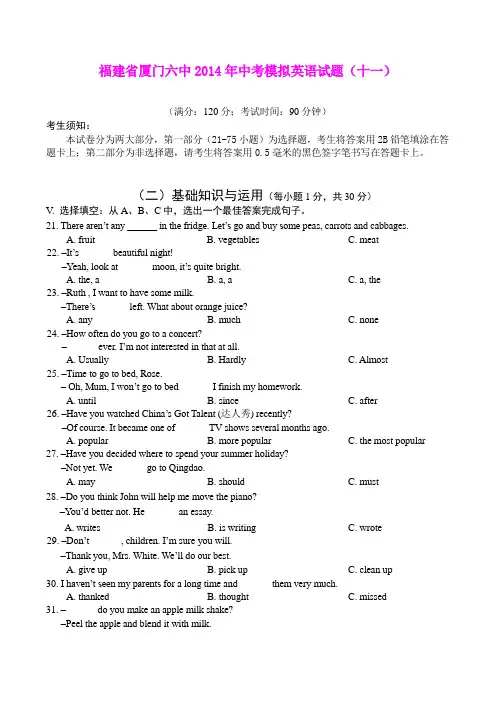
福建省厦门六中2014年中考模拟英语试题(十一)(满分:120分;考试时间:90分钟)考生须知:本试卷分为两大部分,第一部分(21-75小题)为选择题,考生将答案用2B铅笔填涂在答题卡上;第二部分为非选择题,请考生将答案用0.5毫米的黑色签字笔书写在答题卡上。
(二)基础知识与运用(每小题1分,共30分)V.选择填空:从A、B、C中,选出一个最佳答案完成句子。
21. There aren‟t any ______ in the fridge. Let‟s go and buy some peas, carrots and cabbages.A. fruitB. vegetablesC. meat22. –It‟s ______ beautiful night!–Yeah, look at ______ moon, it‟s quite bright.A. the, aB. a, aC. a, the23. –Ruth , I want to have some milk.–There‟s ______ left. What about orange juice?A. anyB. muchC. none24. –How often do you go to a concert?– ______ever. I‟m not interested in that at all.A. UsuallyB. HardlyC. Almost25. –Time to go to bed, Rose.– Oh, Mum, I won‟t go to bed ______ I finish my homework.A. untilB. sinceC. after26. –Have you watched China‟s Got Talent (达人秀) recently?–Of course. It became one of ______ TV shows several months ago.A. popularB. more popularC. the most popular27. –Have you decided where to spend your summer holiday?–Not yet. We ______ go to Qingdao.A. mayB. shouldC. must28. –Do you think John will help me move the piano?–You‟d better not. He ______ an essay.A. writesB. is writingC. wrote29. –Don‟t ______, children. I‟m sure you will.–Thank you, Mrs. White. We‟ll do our best.A. give upB. pick upC. clean up30. I haven‟t seen my parents for a long time and ______ them very much.A. thankedB. thoughtC. missed31. –______ do you make an apple milk shake?–Peel the apple and blend it with milk.A. WhenB. WhyC. How32. –Can I borrow your bike?–Sorry, it‟s broken, it ______ to the bike shop last Saturday.A. was sentB. is sentC. has sent33. The traffic will be much better if everybody ______ the rules.A. will obeyB. obeysC. obeyed34. –Excuse me, could you tell me ________?–It‟s next to the clothes store.A. where is the hospitalB. where the hospital isC. how is the hospital35. –What is your class teacher like?–Oh, he is very kind ________he looks very serious.A. whenB. ifC. though36. –What a mess! Would you mind cleaning the room?–________, Mom, I‟ll do it in a minute.A. SorryB. YesC. Of course37. –Have you ever seen Fu Y andong‟s magic? How cool it is!–Y es, and how much I wish I ________ him.A. amB. wereC. was38. –Oh! You ______ your mobile phone again!–Yeah! And now I can play the game, Angry Birds.A. changedB. had changedC. have changed39. If you want to get good marks, please ______ make the same mistake again, Tom.A. try to notB. try not toC. don‟t try to40. –Sorry, I‟m late, Miss Wang. The minibus broke down, and there were no taxis.–________.A. You‟re welcomeB. That‟s rightC. That‟s all rightVI.完形填空:从A、B、C中,选择一个最佳答案,使短文意思完整。
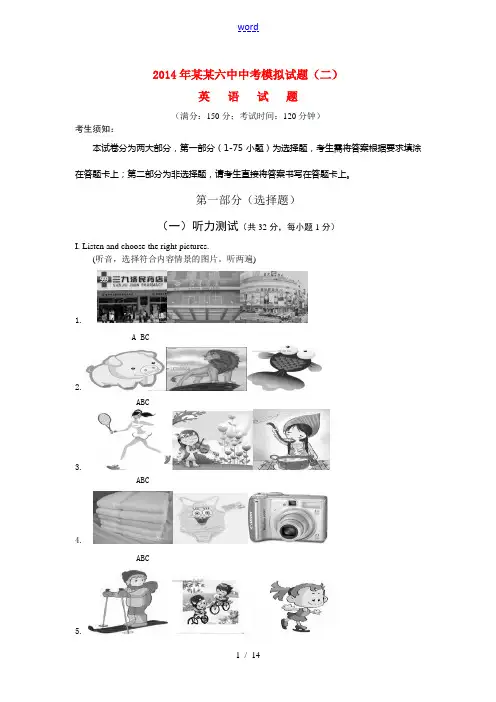
2014年某某六中中考模拟试题(二)英语试题(满分:150分;考试时间:120分钟)考生须知:本试卷分为两大部分,第一部分(1-75小题)为选择题,考生需将答案根据要求填涂在答题卡上;第二部分为非选择题,请考生直接将答案书写在答题卡上。
第一部分(选择题)(一)听力测试(共32分,每小题1分)I. Listen and choose the right pictures.(听音,选择符合内容情景的图片。
听两遍)1.A BC2.ABC3.ABC4.ABC5.ABCII. Listen to some short dialogues and choose the right answers to the questions you hear.(听简短对话,然后挑选最佳答案回答所听到的问题。
听两遍)6.A. Sixty minutes.B. Forty minutes.C. Ten minutes.7.A. They chatted at home.B. They went shopping.C. They went to see a film.8.A. Blue.B. White.C. Black9.A. John.B. Betty.C. Jack.10.A. V olleyball.B. Football.C. Swimming.11.A. Sunny.B. Cloudy.C. Rainy.12.A. 60 dollars.B. 120 dollars.C. 30 dollars.13.A. Noodles.B. Eggs.C. Potatoes.14.A. Mum.B. Tommy.C. Susan.15.A. In the theatre.B. On the bus.C.At the bus stop.III. Listen to a long dialogue and a passage, then choose the right answers to Question16-22.(听一篇较长对话和一篇短文,然后选择正确答案作答16 – 22小题。
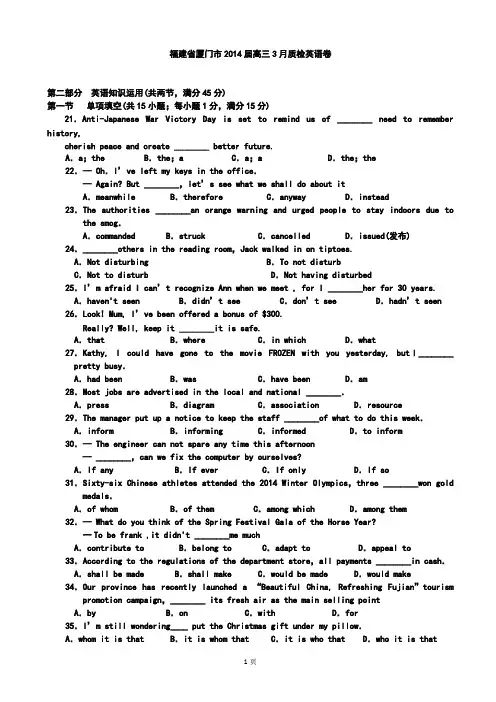
福建省厦门市2014届高三3月质检英语卷第二部分英语知识运用(共两节,满分45分)第一节单项填空(共15小题;每小题1分,满分15分)21.Anti-Japanese War Victory Day is set to remind us of ________ need to remember history,cherish peace and create ________ better future.A.a;the B.the;a C.a;a D.the;the22.— 0h.I’ve left my keys in the office.— Again? But ________,let’s see what we shall do about itA.meanwhile B.therefore C.anyway D.instead23.The authorities ________an orange warning and urged people to stay indoors due to the smog.A.commanded B.struck C.cancelled D.issued(发布)24.________others in the reading room,Jack walked in on tiptoes.A.Not disturbing B.To not disturbC.Not to disturb D.Not having disturbed25.I’m afraid I can’t recognize Ann when we meet , for I ________her for 30 years.A.haven't seen B.didn’t see C.don’t see D.hadn’t seen 26.Look! Mum, I’ve been offered a bonus of $300.Really? Well, keep it ________it is safe.A.that B.where C.in which D.what27.Kathy, I could have gone to the movie FROZEN with you yesterday, butI________ pretty busy.A.had been B.was C.have been D.am28.Most jobs are advertised in the local and national ________.A.press B.diagram C.association D.resource29.The manager put up a notice to keep the staff ________of what to do this week.A.inform B.informing C.informed D.to inform30.— The engineer can not spare any time this afternoon— ________,can we fix the computer by ourselves?A.If any B.If ever C.If only D.If so31.Sixty-six Chinese athletes attended the 2014 Winter Olympics,three ________won gold medals.A.of whom B.of them C.among which D.among them32.— What do you think of the Spring Festival Gala of the Horse Year?一To be frank ,it didn't ________me muchA.contribute to B.belong to C.adapt to D.appeal to33.According to the regulations of the department store,all payments ________in cash. A.shall be made B.shall make C.would be made D.would make34.Our province has recently launched a “Beautiful China, Refreshing Fujian”tourism promotion campaign,________ its fresh air as the main selling point A.by B.on C.with D.for35.I’m still wondering____ put the Christmas gift under my pillow.A.whom it is that B.it is whom that C.it is who that D.who it is that第二节完形填空(共20小题;每小题1.5分,满分30分)You are trapped at the window of a building that is on fire.You hear a man’s voice throughthe smoke 36 you shouting,“Jump!”Will you jump? Will you leave the known(已知),as 37 as it is,and jump into the unknown?The 38 depends on two factors.The first has to 39 how much you know about the person who is shouting to you.Is he 40 ? Will he let you fall to the ground 41support your weight?So it is with all of our 42 .What do we know about the people we would like to 43 ? Will they stand by you when circumstances 44 ? Can they be depended on?It’s like a woman who once purchased two watches from a street vendor(摊贩)on London’s Oxford Street.When she asked if the street salesman could 45 her guarantees,he said.“Certainly , madam.I can give you even 46 guarantees.”Then he added,“The onlything I 47 guarantee is that I will be here this time next Monday morning” So the first part of trust is 48 .Is the other person worthy of your trust?49 important is a second factor, which is ACTION.Will you jump? It 50 little how much you believe you trust someone if you are finally 51 to jump.Will you show your trust for them by jumping?You may be 52 to make a jump.Staying in the burning building is 53 an option,but not one you’ll want to make for long.54 it feels risky to leap into the smoke,you may discover there is a safe and secure 55 .You may also discover that there are those to be trusted.And you may discover that it is worth the jump.36.A.beside B.below C.behind D.above37.A.strange B.dangerous C.secure D.complex 38.A.phenomenon B.problem C.answer D.approach39.A.go with B.make out C.look over D.do with40.A.reliable B.capable C.strong D.clever41.A.but B.and C.or D.then42.A.situation B.options C.character D.relationships 43.A.accompany B.trust C.support D.protect44.A.change B.continue C.disappear D.improve45.A.delay B.consult C.offer D.acquire 46.A.lifetime B.professional C.certain D.annual47.A.mustn’t B.can’t C.needn’t D.won’t48.A.courage B.dependence C.strength D.belief49.A.Equally B.Absolutely C.Basically D.Relatively50.A.costs B.bothers C.matters D.differs51.A.unwilling B.unlikely C.eager D.ready52.A.expecting B.demanding C.deciding D.failing53.A.merely B.always C.hardly D.occasionally54.A.Though B.Because C.When D.Once55.A.survival B.jump C.escape D.landing第三部分阅读理解(共20小题;每小题2分,满分40分)阅读下列短文,从每题所给的四个选项(A、B、C和D)中,选出品佳选项,并在答题卡上将该项涂黑。
福建省四地六校2014届高三高考模拟试题英语第Ⅰ卷(选择题共115分)第一部分听力(共两节, 满分30分)第一节(共5小题;每小题1.5分,满分7.5分)听下面5段对话。
每段对话后有一个小题,从题中所给的A、B、C 三个选项中选出最佳选项,并标在试卷的相应位置。
听完每段对话后,你都有10秒钟的时间来回答有关小题和阅读下一小题。
每段对话仅读一遍。
1. What will the man do this Saturday?A. Go hikingB. Go shoppingC. Have a rest2. How much will the man spend if he rents a car for a week?A. 70 dollarsB. 140 dollarsC. 210 dollars3. What did the woman buy yesterday?A. A new bikeB. A new dressC. A pair of boots4. Where does the conversation most probably take place?A. At the man’s homeB. At a storeC. In the office5. What can we know about the man’s camera?A. He enjoyed using it during the trip.B. He left it at the airport.C. He left it in his friend’s car.第二节(共15小题;每小题1.5分,满分22.5分)听下面5 段对话或独白。
每段对话或独白后有几个小题,从题中所给的A、B、C三个选项中选出最佳选项,并标在试卷的相应位置。
听每段对话或独白前,你将有时间阅读各个小题,每小题5秒钟;听完后,各小题将给出5 秒钟的作答时间。
2014年厦门六中中考模拟试题(三)英语试题(满分:150分;考试时间:4月23日下午2:30—4:30)考生须知:本试卷分为两大部分,第一部分(1-75小题)为选择题,考生将答案用2B铅笔填涂在答题卡上;第二部分为非选择题,请考生将答案用0.5毫米的黑色签字笔书写在答题卡上。
第一部分(选择题)(一)听力测试(每小题1分,共30分)I. Listen and choose the right pictures.(听音,选择符合内容情景的图片。
听两遍)1. A B C2. A B C3. A B C4. A B C5. A B CII. Listen to some short dialogues and choose the right answers to the questions you hear.(听简短对话,然后挑选最佳答案回答所听到的问题。
听两遍)6. A. Tea. B. Milk. C. Water.7. A. In China. B. In the USA. C. In Australia.8. A. A doctor. B. A teacher. C. A nurse.9. A. April 1st. B. May 1st. C. April 30th.10. A. Lily. B. Lucy. C. Johnny.11. A. 30 dollars. B. 60 dollars. C. 120 dollars.12. A. Comedies. B. Documentaries. C. Action movies.13. A. In a bookstore. B. In a library. C. In a classroom.14. A. Every Tuesday. B. Every Thursday. C. Twice a week.15. A. Study for the test. B. Play table tennis. C. Have the test.III. Listen to a long dialogue and a passage, then choose the right answers to questions 16-20.(听一篇较长对话和一篇短文,然后选择正确答案作答16 – 20小题。
2024届福建省厦门六中学毕业升学考试模拟卷英语卷含答案考生须知:1.全卷分选择题和非选择题两部分,全部在答题纸上作答。
选择题必须用2B铅笔填涂;非选择题的答案必须用黑色字迹的钢笔或答字笔写在“答题纸”相应位置上。
2.请用黑色字迹的钢笔或答字笔在“答题纸”上先填写姓名和准考证号。
3.保持卡面清洁,不要折叠,不要弄破、弄皱,在草稿纸、试题卷上答题无效。
Ⅰ. 单项选择1、–– Sorry, Mom. I lost the singing competition.–– Never mind. ________, you have learned something new and had fun.A.At once B.At least C.At first2、Sit closer to the fire. The ________ of it can keep you warm and make your wet clothes dry.A.light B.heat C.cold D.bell3、Y ou are a collective of the experiences you ______ in your own life, so you should be proud of them even the bad ones. A.will have B.have had C.had had D.are having4、—The 24th Winter Olympics will be held in China in 2022.—_______ exciting news it is!A.How B.What an C.What D.How an5、The fans was very excited because their favorite singer _________ during the evening party.A.put up B.stay up C.showed up D.dressed up6、Sir, I know you’ve already slowed down. But could you please _______? I'm not feeling well now.A.to drive slowlier B.drive more slowlyC.to drive more slowly D.drive slowlier7、—Have you heard of Tu Youyou, the famous doctor who won Nobel Prize in 2015?—She devoted as much time as she could ______ on the project artemisinin(青蒿素).A.working B.to work C.worked D.to working8、Not only Ciqikou but Hongyadong ________ well-known to people around China now.A.is B.are C.was D.were9、I love this song by Lady Gaga. Would you ____ the TV a bit, please? I can’t hear it clearly.A.turn on B.turn offC.turn up D.turn down10、—Many students don’t know how to _________the new words in the dictionary.—I think they’d better ask their teachers for help.A.look out B.find out C.look for D.look upⅡ. 完形填空11、Do you think that living a hungry life is last century’s story? Well, it may be this century’s headline.The world has growing 1 about a global food shortage. Right now, there are still 870 million hungry people in the world, according to a survey of the UN’s Food and Agriculture Organization. Children can’t 2 this, either. Around fifteen million children die of hungry each year.What’s causing food shortages? There are several 3There are now more droughts and floods. This is very 4 to farmers and their ability to grow food.Besides, with the growing 5 , feeding everyone becomes more difficult. There are a little more than seven billion people in the world. By 2050, the world population will be more than nine billion.Another reason is food waste. The average person throws away 50kg of food every year.How can we help with food shortages? The easiest way is to 6 on food waste.Next time before throwing away the food on your plate, just think 7 work has been done to make it. By buying less, we waste less. This takes the pressure off producing so much food. And it helps to solve the problem of food shortage. You can also ask your schoolmates to join you.In the early 2016, staff workers from the canteens of Xiamen No.1 High School put up short anti-waste slogans (标语) in dining rooms “Think Before You Waste”. Guess what happened? Students wasted fifteen percent8 food after that! Let’s take action! We don’t need a huge activity to make a difference.1.A.numbers B.thoughts C.worries2.A.escape B.refuse C.have3.A.results B.reasons C.clues4.A.difficult B.harmful C.close5.A.people B.population C.popularity6.A.cut down B.cut off C.cut into7.A.how many B.how much C.how8.A.less B.fewer C.moreⅢ. 语法填空12、阅读短文,在空白处填入一个..适当的词,或填入括号中所给单词的正确形式(不多于3个单词)。
厦门市2014届高三质量检查英语试题本试卷分第—卷(选择题)和第二卷(非选择题)两部分。
第一卷1至13页,第二卷14页。
满分150分.考试时问120分钟。
注意事项:1.答题前,考生务必先将自己的姓名、准考证号填写在答题卡上。
2.考生作答时,请将答案答在答题卡上,请按照题号在各题的答题区域(黑色线框)内作答,超出答题区域书写的答案无效。
在草稿纸、试卷上答题无效。
3.选择题答案使用2B铅笔填涂,如需改动,用橡皮擦干净后,再选涂其他答案标号;非选择题答案使用0.5毫米的黑色中性(签字)笔或碳素笔书写,字体工整、笔迹清楚。
4.保持答题卡卡面清洁,不折叠,不破损。
考试结束后,将本试卷和答题卡一并交回。
第一卷(选择题共115分)第一部分:听力(共两节,满分30分)做题时,先将答案标在试卷上。
录音内容结束后,你将有两分钟的时间将试卷上的答案转涂到答题卡上。
第一节(共5小题;每小题1.5分,满分7.5分)听下面5段对话。
每段对话后有一个小题,从题中所给的A、B、c三个选项中选出最佳选项,并标在试卷的相应位置。
听完每段对话后,你都有10秒钟的时间来回答有关小题和阅读下一小题。
每段对话仅读一遍。
1.How does the woman feel?A.Excited.B.Calm C.Scared2.Why was Jane late?A.She had an exam B.She talked to a teacher C.She stayed up last night3.Who makes the best-looking dumplings?A.Bobby B.Kristen C.Sarah高三英语试题第1页(共14页)4.Where does the conversation most probably take place?A.In a hotel B.At an airport C.At a bus stop5.What will the woman do next?A.Buy the shoes at $150 B.Pay at the full price C.Go to another store第二节(共15小题;每小题1.5分,满分22.5分)听下面5段对话或独白。
2014年厦门六中中考模拟试题(八)英语试题(满分:150分;考试时间:120分钟)准考证号_________________ 姓名__________________ 座位号_________考生注意:本试卷分为两大部分,第一部分(1-75小题)为选择题,请考生将答案用2B铅笔填涂在答题卡上;第二部分为非选择题,请考生将答案用0.5毫米的黑色签字笔书写在答题卡上。
第一部分(选择题)(一)听力测试(每小题1分,共30分)I. Listen and choose the right pictures.(听音,选择符合内容情景的图片。
听两遍)1. A B C2. A B C3. A B C4. A B C5. A B CII. Listen to some short dialogues and choose the right answers to the questions you hear.(听简短对话,然后挑选最佳答案回答所听到的问题。
听两遍)6. A. In his backpack. B. On the dresser. C. On the sofa.7. A. At a zoo. B. At an aquarium. C. At a movie theater.8. A. A TV program. B. A magazine. C. A movie.9. A. By air. B. By train. C. By car.10. A. A doctor. B. A reporter. C. A policeman.11. A. Comedy. B.Thriller. C. Documentary.12. A. 600 yuan. B. 300 yuan. C. 1200 yuan.13. A. By listening to the radio. B. By using a computer. C. By asking a travel company.14. A. A bookstore. B. A furniture store. C. A drugstore.15. A. Thin and have short hair. B. A little heavy and have short hair.C. A little heavy and have long hair.III. Listen to a long dialogue and a passage, then choose the right answers to questions 16-20.(听一篇较长对话和一篇短文,然后选择正确答案作答16 – 20小题。
福建省厦门六中2014届高三考前模拟(英语)2高考英语2014-05-28 0858CBotany, the study of plants, plays a strange role in the history of human knowledge. For many thousands of years it was one field about which humans had little knowledge. It is impossible to know today just what our Stone Age ancestors knew about plants, but from what we can observe of pre - industrial societies that still exists, a detailed learning of plants and their properties(特性) must be extremely ancient. This is reasonable. Plants are the basis of the food pyramid for all living things, even for other plants. They have always been enormously important to the good of people, not only for food, but also for clothing, weapons, tools, medicines, housing, and a great many other purposes. Tribes living today in the woods of the Amazon recognize hundreds of plants and know many properties of each. To them botany has no name and is probably not even recognized as a special branch of “knowledge” at all.Unfortunately, the more industrialized we become the farther away we move from direct relation with plants, and the less clear our knowledge of botany grows. Yet everyone comes unconsciously on a surprising amount of botanical knowledge, and few people will fail to recognize a rose, an apple, or an orchid. When our New Stone Age ancestors, living in the Middle East about 2014,000 years ago, discovered that certain grasses could be harvested and their seeds planted for richer production the next season, the first great stepin a new association of plants and humans was taken. Grains were discovered and from them flowed the marvel of agriculture planted crops. From then on, humans would increasingly take their living from the controlled production of a few plants, rather than getting alittle here and a little there from many varieties that grew wild and the accumulated knowledge of tens of thousands of years of experience and close relations with plants in the wild would begin to fade away.64.What does “Botany” in paragraph 1 refer to ?A.plants B.agriculture C.human knowledge D.the study of plants65.Which of the following assumptions(假设)about early humans is expressed in the passage?A. They probably had wide knowledge of plants.B. They clearly divided knowledge into separate fieldsC. They did not enjoy the study of botany.D. They placed great importance on ownership of property.66.According to the passage, why has general knowledge of botany decreased?A.People no longer value plants as a useful resource.B.Botany is not recognized as a special branch of science.C.Research is unable to keep up with the increasing number of plants.D.Direct relation with a variety of plants has decreased.67.According to the passage, what was the first great step toward the practice of agriculture?A.The invention of agriculture tools and machines.B.The development of a system of names for plants.C.The discovery of grasses that could be harvested and replanted.D.The changing food of early humans.DAll over the country these days, e-mail messages are ending with this strange little mark -) or -(.It was 20 years ago that Scott Fahlman taught the Net how to smile. The Carnegie Mellon computer scientist has devoted his life to man-made intelligence, the practice of teaching computers how to thinklike humans, but the scientist is perhaps best known for a flash of inspiration that helped to define Internet culture.By the early 1980s the Computer Science Group at Carnegie Mellon was making heavy use of online notice boards. A good many of the messages were humorous. The problem was that if someone made a humorous remark, a few readers would fail to get the joke. This problem caused some people to suggest that maybe it would be a good idea to clearly mark messages that were not to be taken seriously. After all, when using text-based online communication, we lack the body language or the tone of voice that communicates this information when we talk in person or on the phone. So on Sept. 19, 1982, Fahlman typed -) in an online message. “I had no idea I was starting something that would soon pollute all the world’s communicationsc hannels,” he wrote later. The “smiley face” has since become common in online communication.This creation caught on quickly around Carnegie Mellon, and soon spread to other universities and research labs by means of the computer networks of the day. Since then, the smiling marks havetaken the e-mail world by storm.Yahoo, Microsoft and America Online all put the faces into their instant-messaging systems, while telecom companies, jewelry makersand online merchants have sent in trademark applications for products and ads that include Fahlman’s smiley face.But Fahlman has never seen a dollar from his creation. “If itcost people a cent to use it, nobody would have used it. This is my little gift to the world, for better or worse,” he said.68. Which of the following is not true?A. Fahlman is a computer scientistB. When using text-based online communication, we can’t use our body languageC. Fahlman has devoted all his life to inventing the smiley faces.D. Fahlman’s smiley face became popular soon after its creation69. The purpose of Fahlman in typing the first smiley face was________.A. to show others that he didn’t take his message seriouslyB. to fill all the world’s communications channels with smiley facesC. to make money out of telecom companies and online merchantsD. to show his happy feelings and to help to define Internet culture70. What does the passage mainly talk about?A. The Internetculture. B. The online communications system.C. The humorous message.D. The online smiley face.71. What can we infer from the text?A. Fahlman invented the smiley faces to become wealthy and famous.B. Fahlman doesn’t mind that people use his smiley faces for free.C. Fahlman is disappointed that nobody would like to pay a cent for the smiley faces.D. The smiley faces were created to pollute the world’s communications channels.E1. What will I need to take a Test?You need a photo ID, your instructor’s name, a pencil or pen, a calculator, etc.2. How will I know about time limits?Students will be informed of any testing time limits, and notified when time is up.3. If I have my books or backpack, does the Test Center have a place to store them while I’m testing?Yes. Students will be asked to leave all books, backpacks, purses and any other personal items in a lockable storage room.4. The only time I can take a test is during lunch. Can I eat my lunch while I am testing?No food or drink are allowed in the Test Center.5. I conduct business via a pager(寻呼机) or cell phone. Will I be allowed to use them in the Test Center?No. all pagers and cell phones must be turned off before entering the Test Center. There are other students testing who may be distracted by these devices.6. If I need to borrow more scratch paper(草稿纸) am I allowed to borrow from another student in the Test Center?Ask the teacher and more material will be given. Talking is not permitted in the Test Center. You will give all scratch paper to the teacher at the end of the test.7. If I start a test but don’t finish it, can I come back the next day to finish it?If you have prior(在先的) arrangements with your instructor you may continue a test the next day. Students are expected to complete their test before closing time of the Test Center. Depending on the test, most tests will not be given within one hour of closing time.72. What does the underlined word “notified” probably mean?A. Noticed.B. told.C. Questioned.D. Warned.73. When you take a test in the Test Center, all of the following are forbidden EXCEPT _____.A. to eat and drinkB. to use your cell phoneC. to leave your purse on the deskD. to ask for more scratch paper74. If you don’t finish the test you ______.A. must turn in the paper on timeB. should get help from your instructorC. can continue it the next day by prior arrangementD. can take the paper out of the center75. What would be the best title for the passage?A. Frequently asked questions about the Test CenterB. Useful suggestions on different kinds of testsC. General requirements for students to have testsD. Brief introduction to the Test Center第Ⅱ卷(非选择题共35分)第四部分写作(共两节,满分35分)第一节:短文填词 (本节共10小题,每小题1分,满分10分)阅读下列短文,并根据所给的提示,在每个空格填入一个恰当的单词。